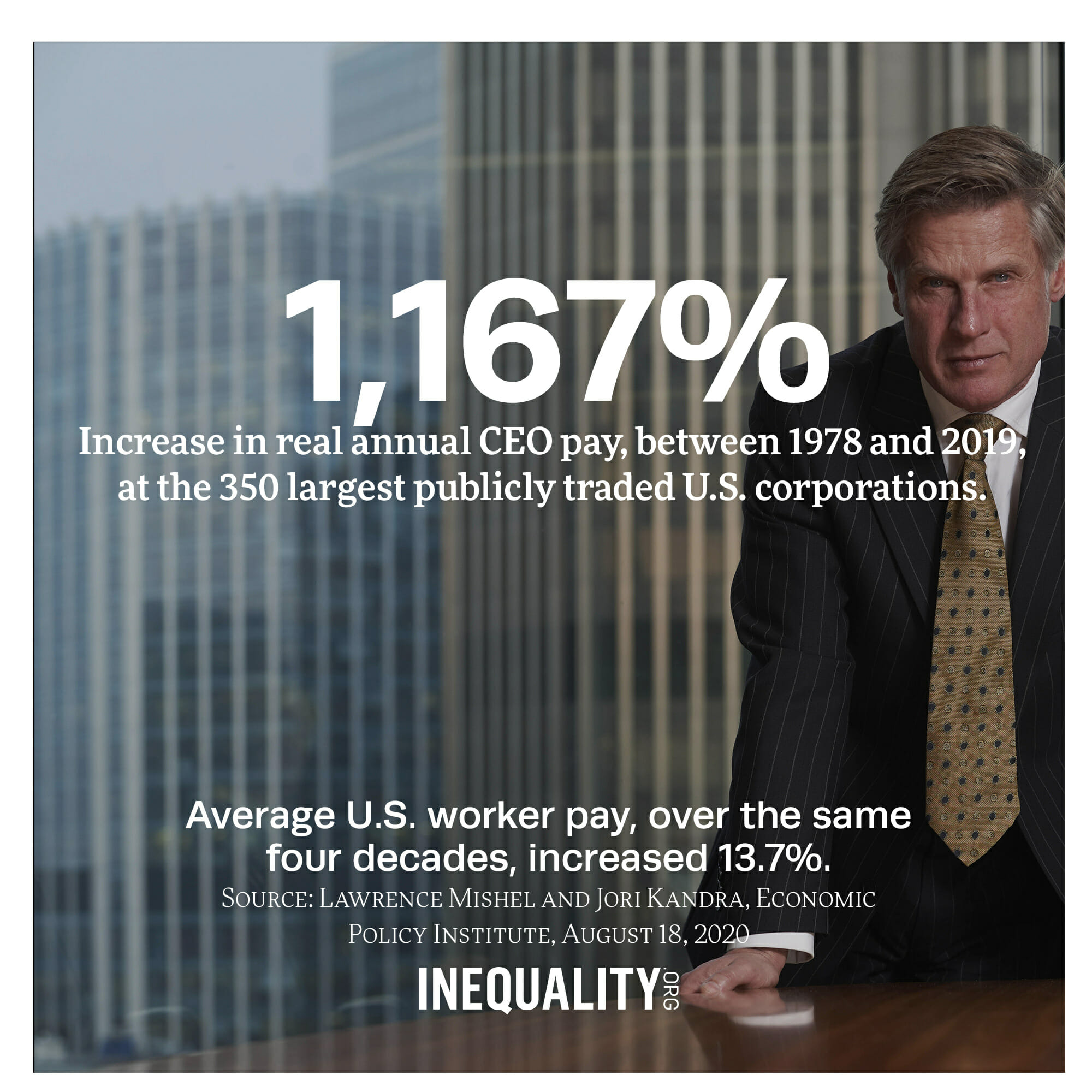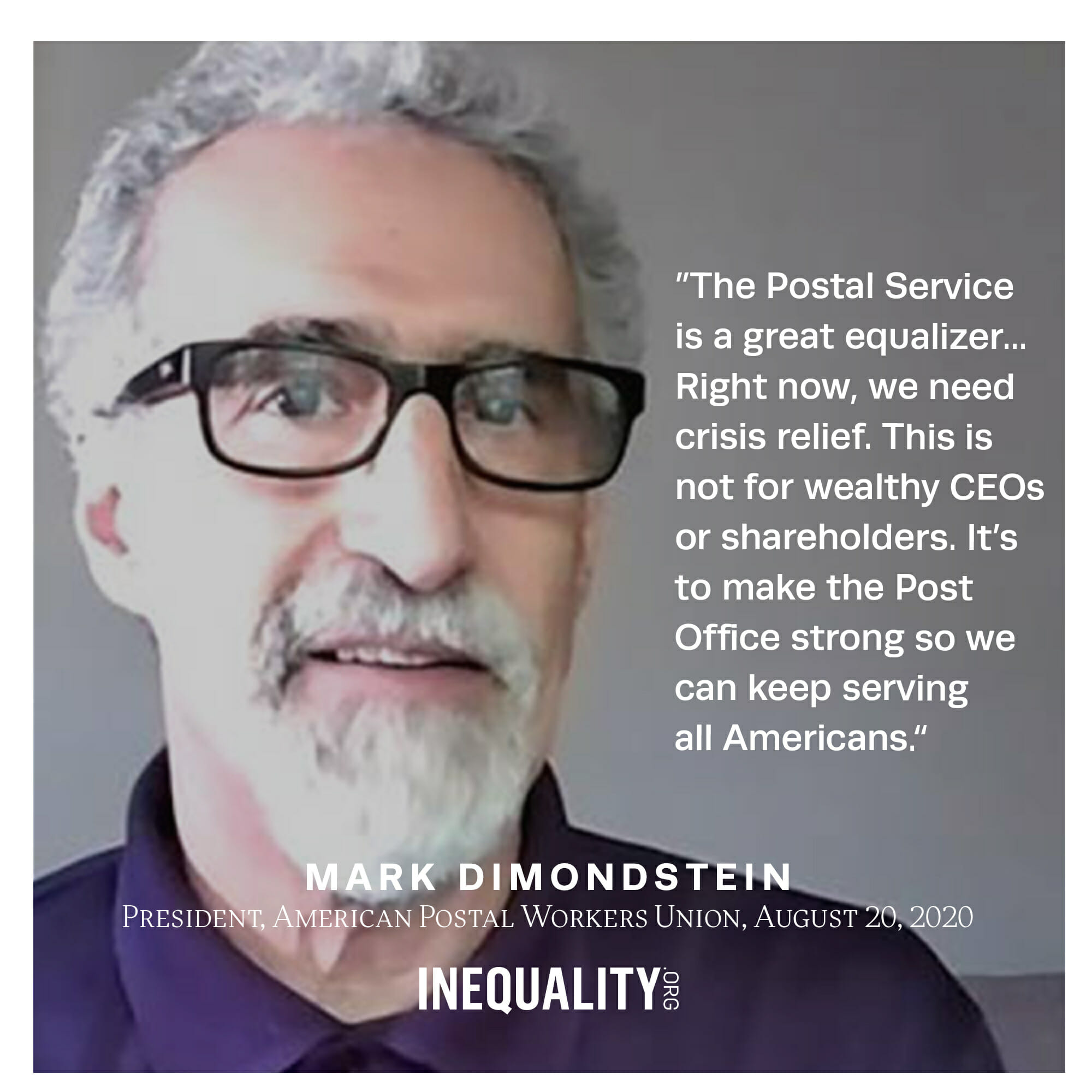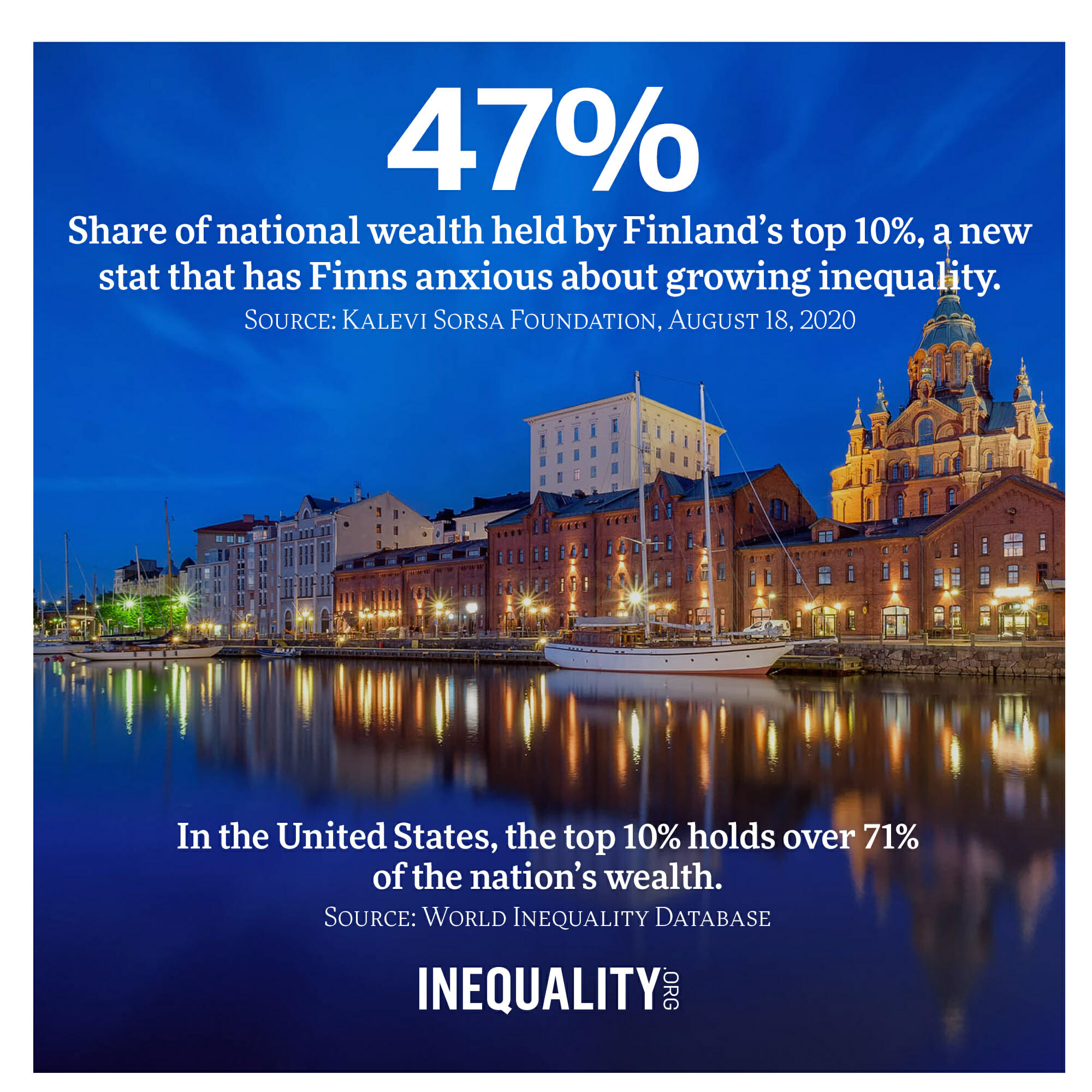| THIS WEEK |
Who would have thought, at the start of this summer, that Americans the nation over would be spending an August weekend protesting about . . . the U.S. Postal Service? But this past weekend we saw just that: demonstrations in support of the Post Office, the nation’s oldest public service, in communities big and small.
Americans don’t want postal services cut. They don’t want the mail manipulated for political purposes. And they certainly don’t want the Postal Service privatized to create still more billionaire fortunes. On Saturday, lawmakers in the House of Representatives passed legislation to put the brakes on the White House assault on our mail, but the Post Office battle, as my colleague Sarah Anderson stresses, is only beginning.
We have more in this week’s issue on the broader inequality battlefront, with coverage on everything from the latest Big Pharma corona greed grab to growing CEO pay gaps and new strategies for reining in the scourge of hidden wealth and tax avoidance. Read on!
Chuck Collins, for the Institute for Policy Studies Inequality.org team |
|
| |
|
| INEQUALITY BY THE NUMBERS |
 |
|
|
|
| |
|
| FACES ON THE FRONTLINES |
 |
| Helping New Americans Navigate the Crisis |
| Earlier this year, in the small city of Manchester, New Hampshire, the local nonprofit Victory Women of Vision braced for hard times after Covid-19 shuttered schools and businesses. The group, founded by Democratic Republic of the Congo native Mary Georges, serves a community known as New Americans: immigrants and refugees from countries all over the world. These New Americans have been relying, throughout the pandemic, on Victory Women as their main source of economic, educational, and emotional support. IPS Inequality team member Sophia Paslaski has the story. |
|
| |
|
| WORDS OF WISDOM |
 |
|
|
|
| |
|
PETULANT PLUTOCRAT
OF THE WEEK |
 |
| A Pretty Penny for This Gilead CEO’s Latest Balm |
| Big Pharma giant Gilead last year dropped a sweet $31 million on its new CEO Daniel O’Day, along with marching orders to find a new path to greater profits. O’Day didn’t have to look far. The pandemic has given Gilead a new application — reducing Covid-19 recovery time — for its already developed antiviral drug remdesivir. Gilead will be charging up to $3,120 for a five-day treatment, a price state attorneys general are calling “unconscionable” since the drug costs under $12 to manufacture. Critics are also charging that Gilead holds a patent on another antiviral that could serve as a less expensive substitute. Why isn’t Gilead pushing that alternative? The drug’s patent turns out to expire five years sooner than the patent on remdesivir. So Gilead stands to make oodles less off it. O’Day, meanwhile, is dismissing all the critical static. All Covid patients, he insists, “will have access.” Yes, but only because tax dollars will be paying for 500,000 treatment courses of remdesivir through September, quite enough to guarantee O’Day and Gilead still another year of windfalls. |
|
| |
|
| BOLD SOLUTIONS |
 |
| How We Can Shut Down Pandemic Wealth Hiding |
| The pandemic’s most unnoticed conequence? It’s providing cover for aggressive estate tax avoidance. IPS associate fellow Bob Lord has just completed a new primer on the tools wealth managers are using to facilitate this wealth vanishing act. His policy brief, Covid-19, A Perfect Storm for Estate Tax Avoidance, provides a readable overview to how the rich are deploying two pivotal planning devices: the Intentionally Defective Grantor Trust, or IDGT, and the Granter Retained Annuity Trust, or GRAT. The antidote for this tax avoidance: Shut down trusts and loopholes that have no other purpose than tax avoidance. But what about the trillions already been parked in trusts? Lord proposes we transition the estate tax to an inheritance tax on beneficiaries, as described by New York University Law Professor Lily Bachelder. |
|
| |
|
| GREED AT A GLANCE |
 |
|
|
|
| |
|
| TOO MUCH |
 |
| Tweaking the Arithmetic of Chief Exec Avarice |
| Top corporate execs in the United States, turns out, are making even more than we thought. So show new calculations from the Economic Policy Institute that revise EPI’s previous approach to valuing CEO stock awards. The bottom line: In 2019, big-time CEOs averaged 320 times more pay than average American workers. The ratio in 1978: 31.4 times. What can we do? One EPI suggestion: start considering tax hikes on corporations with excessive gaps between CEO and worker pay. Inequality.org co-editor Sam Pizzigati has more. |
|
|
|
| |
|
| MUST READS |
This week on Inequality.org
Sarah Anderson, The Fox is Still in the Henhouse at the Post Office. In the face of a historic public outcry, the postmaster general has promised to stop sabotaging essential services — temporarily.
Scott Klinger and Sarah Anderson, Are Postal Service Cuts Motivated by Voter Suppression or Privatization — or Both?. The Postmaster General’s actions are advancing two of President Trump’s goals: undermining confidence in vote by mail and laying a foundation for postal privatization.
Elsewhere on the Web
Chuck Collins and Frank Clemente, It is time to levy a one-time pandemic wealth tax on billionaire’ windfall gains, MarketWatch. Nothing symbolizes the inequality of coronavirus sacrifice more than watching a few hundred billionaires gain mightily while everyone else struggles through job losses, debilitating illness, and death.
Dominic Rushe, Making billions v making ends meet: how the pandemic has split the US economy in two, Guardian. U.S. billionaire wealth is soaring while millions remain unemployed, creating a society with what amounts to two separate, deeply unequal economies.
Julie Belcove, Money Can Buy You a Lot of Things, But Experts Say Happiness Isn’t Necessarily One of Them, Robb Report. People with higher earnings tend to spend less time on activities that bring them joy and more time in the pursuit of yet more riches.
Eileen Appelbaum and Eleanor Eagan, A Day One Agenda for Private Equity, American Prospect. A new administration would have opportunity aplenty to weaken the power of private equity’s financial titans.
Morris Pearl and Ajay Puran, A Wall Street Investor and an Unemployed Immigrant Cook Agree: Tax Billionaires, Support Excluded Workers, Gotham Gazette. A plea from two individuals sitting on opposite sides of the inequality divide.
Owen Jones, To give pupils the best chances in life, look at inequalities outside the school gates, Guardian. In the UK, as elsewhere, conservatives consider talent finite and see the job of schools to locate the few who have it and allow them to flourish. They see social mobility — the process by which these talented few rise out of their class — as excusing inequality.
Kunal Sen, Five ways coronavirus is deepening global inequality, The Conversation. A survey that ranges from jobs to vaccines. |
|
| |
|
| A FINAL FIGURE |
 |
|
|
|
| |
|
| WORK WITH US! |
| We’re Hiring an Inequality.org Managing Editor! |
| The Inequality team at the Institute for Policy Studies works with partners to reverse the maldistribution of income and wealth that is undermining our democracy, fraying our social fabric, and destroying our planet. We’re looking for a new managing editor for the Inequality.org website and weekly newsletter, ensuring that the content stays fresh and meets high-quality standards for a broad, general audience. This full-time, full-benefit position will operate out of our office in Washington, D.C., pandemic permitting. |
|
|
|
| |
|
|